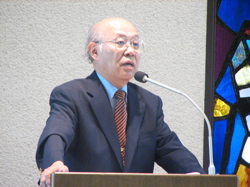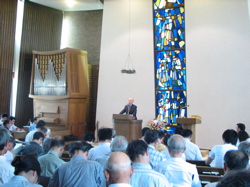Center for Interdisciplinary Study of Monotheistic Religions(CISMOR)Doshisha University
> Public Lectures > The Personal Deity in the Ancient Mesopotamian ReligionPublic Lectures
Lecture (Open for the public)
The Personal Deity in the Ancient Mesopotamian Religion
| Date: |
2008/07/26 14:00-16:00 |
|---|---|
| Place: | Chapel in the Divinity Hall, Imadegawa Campus, Doshisha Univ. |
| Lecture: |
Prof. Ichiro Nakata (Emeritus professor of Chuo University, Former board member of The Society for Near Eastern Studies in Japan) |
| Summary: | |
|
It is often said that ancient Mesopotamia is a world of polytheism because each city contained numerous temples and festivals for many deities were held. However, in addition we know from the manuscripts of a ‘personal deity’ who is referred to as ‘my god’ or ‘your god’. The lecturer discussed examples from ancient Mesopotamia in around 2000 B.C., showing what the ‘personal deity’ is and outlining the relationship between this ‘personal deity’ and everyday people. A variety of ancient documents (ritual, administrative, and didactic) attest that Mesopotamian society was polytheistic. For example, a set of manuscripts dealing with sacrifice show that there were twenty-five deities in the kingdom of Mari under the king Hammurabi. On the other hand, these manuscripts sometimes show us the range of personal piety among everyday people. In one of the manuscripts dealing with Mari noted above, the names of several deities are related. For example, in a letter the author referred to three deities: a deity of the kingdom, a deity of the city, and a deity of the author. This last, expressed as ‘my god’ and ‘your god,’ is the ‘personal deity’. Who the personal deity is depends on the author’s gender, social rank, etc. The king has his personal deity and a girl has hers. Thus the personal deity was not always a nameless or low god because people selected their personal deities in light of their position, personal wish, etc. Personal deities were those who stand between the deity of kingdom, city and person and are therefore intermediate. They played the roles of guardian, lawyer, doctor, and so on. However, the personal deity did not always realize or fulfill a person’s wish. We see a lot of literary works treating cases in which a righteous person suffers unjustly-the problem of theodicy. Differently from the deities of kingdom and city, the relationship between personal deity and a person is characterized by very intimate and concrete interests. Ancient Mesopotamia was definitely part of the polytheistic world because it knew and venerated numerous gods. However, people had their own personal piety and a relationship with personal deities. The lecturer ended by pointing out the uniqueness of such a form of polytheism. Kenichiro Takao (Graduate Student of School of Theology, Doshisha University) |
|
|
Handout |
|

